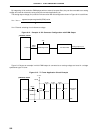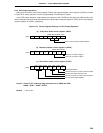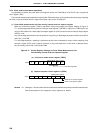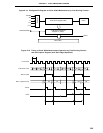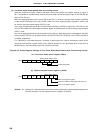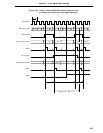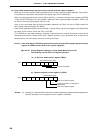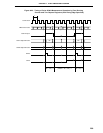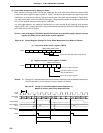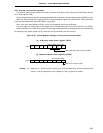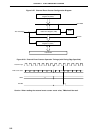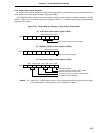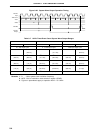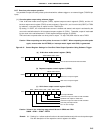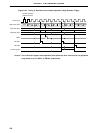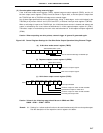
210
CHAPTER 8 16-BIT TIMER/EVENT COUNTER
(4) Pulse width measurement by means of restart
When input of a valid edge to the TI00/P00 pin is detected, the count value of the 16-bit timer register (TM0)
is taken into 16-bit capture/compare register 01 (CR01), and then the pulse width of the signal input to the
TI00/P00 pin is measured by clearing TM0 and restarting the count (see register settings in Figure 8-24).
The edge specification can be selected from two types, rising and falling edges, by bits 2 and 3 (ES10 and
ES11) of the external interrupt mode register 0 (INTM0).
In a valid edge detection, the sampling is performed by a cycle selected by the sampling clock selection
register (SCS), and a capture operation is not performed before detecting valid levels twice allowing short
pulse width noise to be eliminated.
Caution If the valid edge of TI00/P00 is specified to be both rising and falling edge, capture/compare
register 00 (CR00) cannot perform the capture operation.
Figure 8-24. Control Register Settings for Pulse Width Measurement by Means of Restart
(a) 16-bit timer mode control register (TMC0)
(b) Capture/compare control register 0 (CRC0)
Remark 0/1: Setting 0 or 1 allows another function to be used simultaneously with pulse width measurement.
See the description of the respective control registers for details.
Figure 8-25. Timing of Pulse Width Measurement Operation by
Means of Restart (with Rising Edge Specified)
TMC0 00/1010000
OVF0
TMC01TMC02TMC03
Clear & start with valid edge of TI00/P00 pin
CRC0 11100000
CRC00CRC01CRC02
CR00 set as capture register
Captured in CR00 on invalid
edge of TI00/P00 Pin
CR01 set as capture register
Count
Clock
TM0 Count
Value
TI00 Pin Input
CR01 Capture
Value
CR00 Capture
Value
INTP0
t
0000 0001 D0 0000 0001 D1 00010000D2
D0 D2
D1
D1 x t
D2 x t



